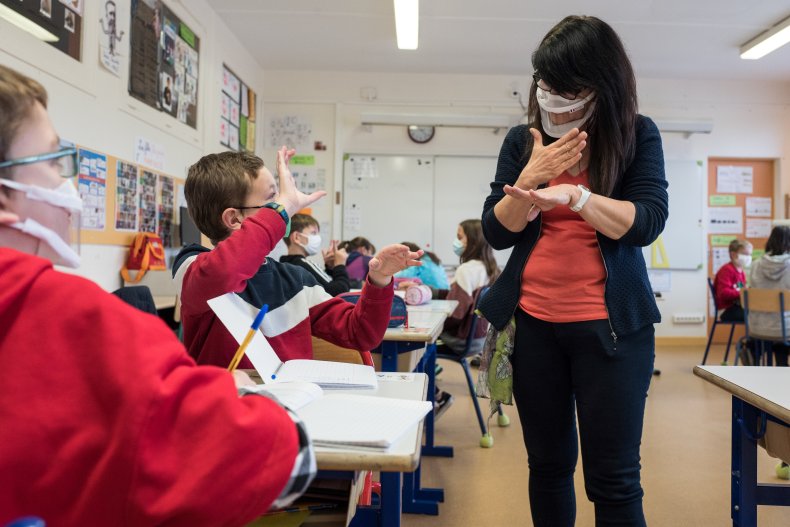Those Proposing Forever Masking Should Think of Deaf People Like Me | Opinion
Dr. Anthony Fauci, President Biden's chief adviser for COVID-19, recently put a damper on hopes that life would soon return to normal. In an interview with CNN, Dr. Fauci said Americans should keep wearing masks and social distancing even after getting the vaccine.
This was bad news for many Americans. But it was especially bad news for members of the Deaf and hard-of-hearing community, who are in for many more months of struggling to navigate the new pandemic world.
For in addition to people who find masks suffocating or inconvenient are a host of Americans whose already-difficult lives have been rendered all the more so by the masking mandate. Anyone living with hearing loss will have difficulty following a conversation when face masks cover the speakers' lips. Face masks obscure both the faces and sounds, and make lipreading and using sign language difficult.
In other words, this necessary precaution for preventing the spread of COVID-19 has made the lives of people who are Deaf and hard of hearing even more difficult—at the worst possible time. In scary times like these, being unable to hear those around you is terrifying and makes a hearing disability feel worse than it is.
For myself, I find the loss of conversation devastating, and it adds to the isolation that Deaf people already experience. I also suffer shame and embarrassment at being unable to hear basic instructions, especially when there are so many rules to follow now.
It's not just the rules. For those who use American Sign Language (ASL), video calls can work well, provided an interpreter is available. And yet, of the 30 million people suffering from hearing loss in the U.S., a mere 1 million use ASL. The vast majority of Deaf people struggle to understand video call conversations.
This means that remote working or studying or going to class is going to present a huge challenge. Meetings or classes over the phone or video call are difficult for many of us and impossible for many more. Online learning is inaccessible and ostracizing for children and young people with hearing disabilities, leaving them left out and alone when they need the most support.

As an adult learner, I have stopped attending live classes, as I cannot hear most of the lectures. I find myself isolated, even within my tutor group, as a result.
Then there are issues accessing medical care. I have had to access essential medical care via a telephone call, which is far from ideal for my disability and would be entirely impossible for someone profoundly Deaf. When my medical complaint eventually led to an in-person appointment, I could not lipread because the health provider was wearing protective gear including a mask, and I found myself struggling to understand what was wrong with me and how I was meant to take the medication.
But the difficulties surrounding using the phone or a video call also cause isolation—and consequent mental health problems. Being forced to communicate with your nearest and dearest in challenging, even impossible ways has a significant impact on emotional and mental health.
And Deaf people are already vulnerable to increased mental health problems, like depression and anxiety. The Deaf and hard-of-hearing community are almost always isolated, and many of us suffer from depression and loneliness.
For the Deaf and hard of hearing, close personal contact is essential to bolster mental health and better understand speech. And yet, social distancing and meeting loved ones outdoors causes no end of trouble for people like me. Traffic noise and wind impede my ability to hear speech, and wet weather means I can't wear my hearing aids. It is also challenging to hear and lipread from a few meters away.
Suffering from a hearing disability was never easy. But the coronavirus pandemic has made it almost impossible to be Deaf.
I personally have encountered inaccessible classes, the loss of lipreading, and the challenges of receiving medical care over the phone, which I struggled to hear. But I am just one person, and there are 30 million other stories across the U.S.
The pandemic has placed a massive strain on every single American, but it has given the Deaf and hard of hearing community particularly difficult challenges to overcome.
Please keep that in mind when you hear people upset about the idea of masking even after they are vaccinated. They may be speaking on behalf of one of us.
Melanie Ashford is a freelance writer from the UK.
The views in this article are the writer's own.


